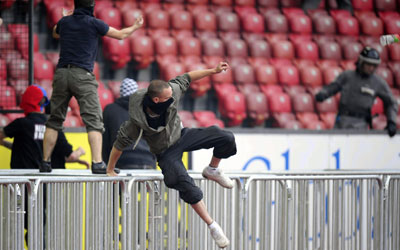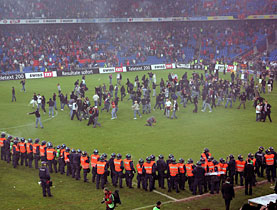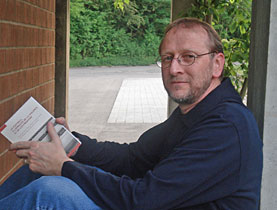Blatter demands action over Swiss hooliganism

Switzerland lags five to ten years behind other European countries in tackling football hooliganism, warns Fifa President Sepp Blatter.
Over the past week violent scenes have once again been witnessed at football matches in Bern, Zurich and Sion. Yet the authorities and the police seem unable to stamp out the persistent problem in and around Swiss football and hockey stadiums.
On Wednesday evening several hundred fans of FC Sion and FC Young Boys clashed in the centre of Bern before and after the Swiss Cup Final. Sion fought back from 2-0 down to beat Young Boys 3-2 in the 88th minute of a dramatic match.
In all, ten fans were admitted to hospital and 64 were arrested, of whom 15 have been charged with violence against police officers, vandalism, wearing a balaclava or carrying fireworks.
The violence follows incidents in Zurich between supporters of FC Zurich and FC Basel on Sunday, which led to a riot between fans and police. League leader Zurich missed a chance to clinch the Swiss championship, losing 3-1 at home to second-place Basel.
The police charged 12 fans for violent behaviour and attacks against police.
There are fears that violence could again erupt in the last two games of the season with Zurich and Basel poised neck and neck for the championship.
“We are five to ten years behind other European countries in tackling football hooliganism,” Blatter told Swiss-German television on Thursday.
Other leagues have nipped the problem in the bud a long time ago thanks to better organisation of fans in the stadium, better education and stadium bans, he said.
“The safest thing is to get rid of terraces. There are no more standing terraces in England or in Spain. Someone sitting down is calmer than someone standing,” said the Fifa president.
Blatter said the Swiss authorities had to get on the ball.
“I hope the new Swiss Football Association president, who is elected in June, will deal with this problem and not just say ‘It’s nothing to do with us, it’s the league’. No, it’s a problem for Swiss football.”
A clear problem
The Swiss authorities say they recognise there is a problem, however.
“Of course there is a problem; we’ve said so for a long time,” Edmond Isoz, director of the Swiss Football League (SFL), told Le Temps newspaper. “Things calmed down with Euro 2008, but since then it’s worse than ever. We are very worried. We are starting to think that it needs a death for things to change.”
A volley of anti-hooligan initiatives and legislation was introduced in 2006 to crack down on violent fans especially for the 2008 European Football Championship and the 2009 Ice Hockey World Championship.
These include a national hooligan database, travel restrictions for known troublemakers, stadia bans, obligations to attend police stations on match days and 24 hour preventive custody.
But critics say it is too early to say how effective these measures are and unclear how well the police are applying them.
“Today I’m scared to go to certain stadiums with my kids; that’s not normal,” said Massimo Lorenzi, head of sport at the French-speaking national TV station (TSR), whose cameraman and journalist were attacked by Sion fans last Saturday at the FC Sion-FC Xamax league match.
Inside the stadia
Over recent years football violence has generally relocated itself outside stadiums. But on Sunday Basel fans invaded the pitch at the Letzigrund stadium and rival groups of fans tried to attack each other inside the arena.
The football authorities are frustrated by the current situation, whereby Swiss clubs are responsible for stadium security, which is carried out by private security firms but which cannot make arrests. Cantonal police say their own officers are not trained to intervene inside sporting arenas, except in urgent situations.
“In Germany if a fan fires a rocket in a stadium they are arrested and taken directly to the police station. Here we can only report them and we know it’s then very difficult to provide formal proof. They are very clever with the cameras. They put on balaclavas or hide,” said Isoz.
Piermarco Zen-Ruffinen, a law professor at Neuchâtel University, felt it was high time the state got involved when trouble breaks out in Swiss stadiums.
“I am in favour of state intervention; it’s easy to put the blame on the stadium owners,” he told Le Temps newspaper.
“I don’t understand the current mentality. It’s often the case in Switzerland. The situation really has to degenerate before any steps are taken. It’s a lack of courage and a question of willingness.”
Away from the arena
Following this week’s violent incidents, experts have been quick to suggest solutions.
There have been numerous calls for a stricter application of existing laws, like stadium bans. Around 500 hooligans are presently banned from Swiss stadiums.
Reto Nause, director of the Bern police, criticised the organisers of Wednesday’s match for not rigorously respecting stadium bans on certain fans.
FC Xamax President Sylvio Bernasconi echoed this sentiment: “I don’t understand why we can’t solve things and do what they managed to do in England. You have to put [violent fans] on police files and require them to report to police stations on the day of the match,” he told Le Temps newspaper.
Hooligan expert Dölf Brack told the Zurich radio station Radio 1 that banning away-supporters from “high-risk” games would help solve the problem, together with higher ticket prices.
And the head of security at the Swiss Football Association, Ulrich Pfister, suggested starting “high-risk” games at midday so violent fans would have less time to get drunk before a match.
Simon Bradley, swissinfo.ch and agencies
Switzerland has been affected by football hooliganism since the start of the 1980s.
There have been serious incidents at regular intervals. Experts say football hooliganism now affects almost all teams in the top division and a series of less spectacular local incidents together add up. The problem has fragmented and clashes are difficult to predict and manage.
In June 2006 the Swiss Football League unveiled tougher measures against hooligans. Clubs are now more responsible for their fans when they play away games, meaning they have to organise the ticket sales for their sections of the away stadium themselves.
The guest club also has to take the personal details of their fans as well as provide somebody from the club to accompany the supporters and record violent incidents. An anti-violence campaign and mobile cameras, financed by the league, were also introduced.
These initiatives came on top of a raft of anti-hooligan measures approved by parliament in 2006 to crack down on violent fans ahead of the 2008 European Football Championship. They included a national hooligan database, travel restrictions for known troublemakers, stadia bans, obligation to attend police stations on match days and 24hr preventive custody.
These modifications, which were urgently introduced into federal internal security law, will become part of cantonal legislation from January 2010. So far 15 cantons out of 26 have ratified the changes.

In compliance with the JTI standards
More: SWI swissinfo.ch certified by the Journalism Trust Initiative



You can find an overview of ongoing debates with our journalists here. Please join us!
If you want to start a conversation about a topic raised in this article or want to report factual errors, email us at english@swissinfo.ch.